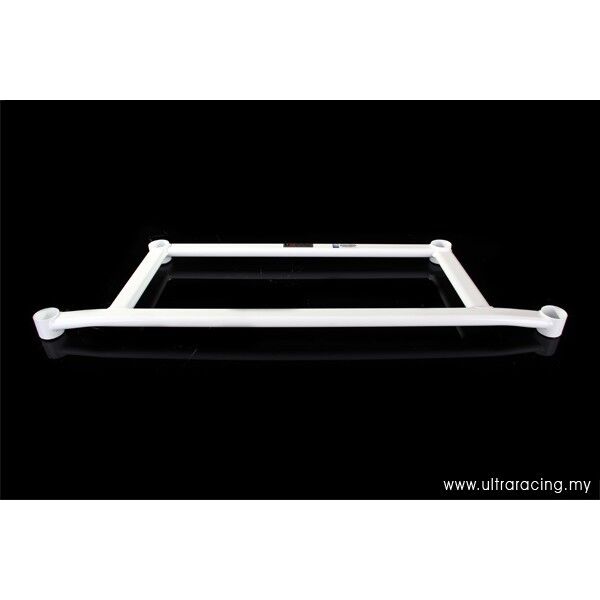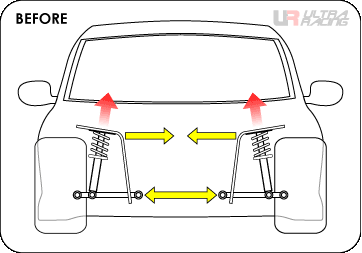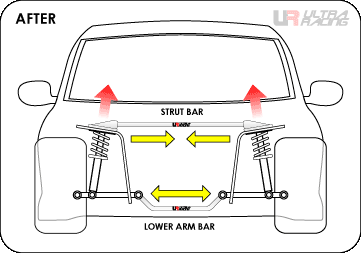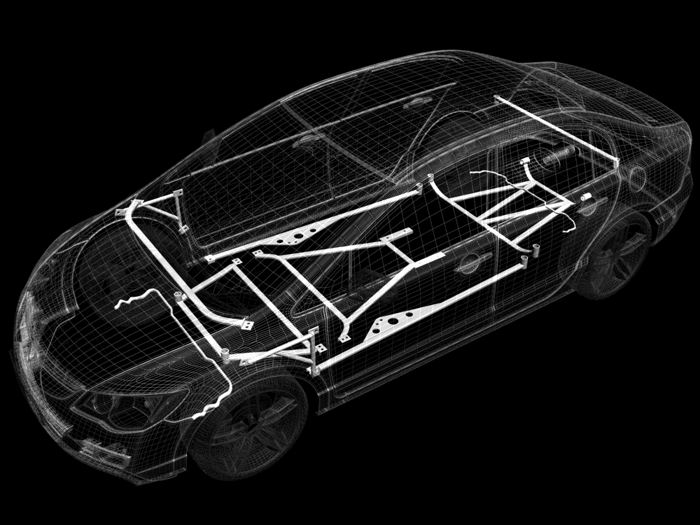Ultra Racing
Ultra Racing Front Lower Brace Audi / Skoda / VW models LA4-1192
Ultra Racing Front Lower Brace Audi / Skoda / VW models LA4-1192
Couldn't load pickup availability
-
Description
Ultra Racing
Applications:
| Make | Model | Variant |
| Audi | A3 Mk2 (8P) | 2.0 2003- |
| Volkswagen | Golf Mk5 | GTI |
| Volkswagen | Golf Mk5 | R32 |
| Volkswagen | Golf Mk6 | R |
| Volkswagen | Golf Mk6 | GTI |
| Volkswagen | Scirocco | 2.0 2008- |
| Volkswagen | Passat CC | 2.0 TSI 2008- |
Product Type: Front Lower Brace
Manufacturers Part Number: LA4-1192
Chassis Braces Explained
How it Works
Understanding between Chassis and Handling
A car chassis is carried by four wheels and four shock absorbers. When driving on a bumpy road, the shock of the impact will be absorbed by the shock absorber, however if the chassis is not strong enough to support the shock absorber, the shock of the impact will not all be absorbed by the shock absorber but also by the chassis, causing chassis flex. The same applies as a corner is turned, the chassis will be twisted by the force of weight transfer. Therefore, the handling will be compromised and somewhat unpredictable.
To solve the chassis flex problem and improve handling, Ultra Racing’s chassis strengthening components were developed. In short, the stronger the chassis, the better the handling.
Technical Information
Strut Bars and Chassis Strengthening Technology:
If you’re serious about your car’s handling performance, you will first be looking at lowering the suspension. In most cases, unless you’re a complete petrolhead, this will be more than adequate. However, if you are a keen driver, you will be able to get far better handling out of your car by fitting a couple of other accessories to it. The first thing you should look at is a strut brace.
When you corner, the whole car’s chassis is twisting slightly. In the front (and perhaps at the back, but not so often) the suspension pillars will be moving relative to each other because there’s no direct physical link between them. They are connected via the car body, which can flex depending on its stiffness.
A strut brace bolts across the top of the engine to the tops of the two suspension posts and makes that direct physical contact. The result is that the whole front suspension setup becomes a lot more rigid and there will be virtually no movement relative to each side. In effect, you’re adding the fourth side to the open box created by the subframe and the two suspension pillars.
Is there a need to have our vehicle chassis strengthened?
The chassis of the car is the part which experiences the most of the abuse from the driver. This is largely due to the weight transfer of the vehicle body during fast cornering, hard braking or hard acceleration. In some instances, the weight transfer during cornering may cause one side of the vehicle to experience as much as three times more force than the other side of the vehicle, causing enormous chassis flex / vehicle body deformity and twist, consequently causing tires to lose grip. Deformity and twisting of the vehicle chassis during cornering may cause negative handling traits such as understeer and oversteer.
What is Oversteer and Oversteer?
• As most modern cars go, car manufacturers employ the FF (Front engine, Front wheel drive) setup for improving driver and passenger safety. The natural behavior of an FF car is to have slight understeer, due to its heavier front end. Understeer happens when the front wheels lose their traction and won’t turn any sharper, even when the steering is being corrected to turn the car more. This will cause the car to go wide instead of following the line. Understeer can be corrected by stiffening the rear end of the vehicle by adding a rear strut bar and a rear anti roll bar.
• Oversteer is when the rear tires lose grip causing the rear end of the vehicle to slide out of a corner. This phenomenon happens particularly to FR (Front engine, Rear wheel drive) or RR (Rear engine, Rear wheel drive) cars. Oversteer can be corrected by stiffening the front end of the vehicle by adding front strut bars and front anti roll bars.
What is Chassis Flex?
With a strengthened chassis, the vehicle will react better to tuning changes. The improvement is particularly obvious with a hard suspension setup. The chassis is also able to cope better with engine and braking system upgrades. A strengthened chassis, by Chassis Strengthening Technology, will also protect the vehicle platform improving longevity under hostile conditions, especially with a monocoque vehicle platform.





